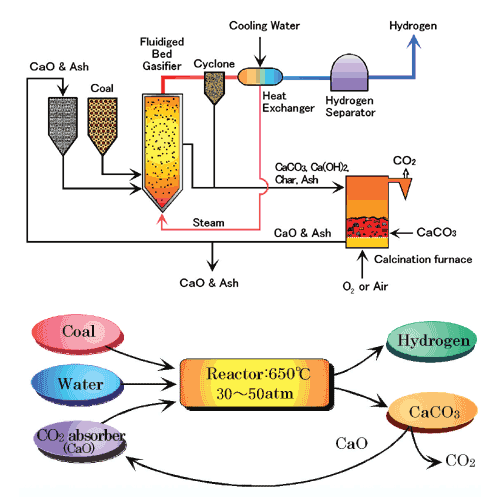Category of New Energy
Development of the production and separation method of hydrogen with CO2 recovery / NEDO project in 2000-2010
We have developed a high-efficiency hydrogen production process from coal. The fundamental concept behind the process is the integration of a water-carbon reaction, water-gas shift reaction, and CO2 absorbing reaction in a single reactor, at a temperature of approximately 650℃ and a pressure of 3 MPa or greater. As shown in the diagram, the introduction of coal, an absorbent (CaO), and water into a high-pressure reactor accelerates the decomposition of coal, and, at the same time, the CO2 produced from this is fixed into CaCO3 by the absorbent. The subsequent reaction resolves the water to produce a large amount of hydrogen. After CaCO3 is calcinated, the CaO is again put into the reactor with the coal and the CO2 can be recovered.
Development of direct carbon fuell cell (DCFC)
Fuel cells such as Molten Carbonate Fuel Cell (MCFC) and Solid Oxide
Fuel Cell (SOFC) have been developed toward the practical use. Hydrogen
of these fuel is produced from natural gas, coal and biomass. On the other
hand, because the power generation in DCFC uses the carbon rod produced
from biomass, coal, coke and organic wastes, the theoretical conversion
efficiency is approximately 100%. Our laboratory develops DCFC and investigates
the characteristics of the power generation using DCFC.
-
Development of the liquid production process via biomass gasification (Biomass to Liquid, BTL) / NEDO project in 2012-2013
The liquid production process via biomass gasification (BTL) has been developed. In the BTL process, the synthetic gas composed mainly of H2 and CO is produced and cleaned, followed by the liquid production using Fischer-Tropsch (FT) synthesis. The FT synthesis produces gasoline, kerosene, light oil and heavy oil. However, in previous studies, only alternative fuel such as gasoline and light oil for a car and no alternative aviation fuel such as kerosene was focused on. In the study, the FT synthesis is experimentally investigated for the purpose of the production of alternative aviation fuel. Recently, in the NEDO project, the high-efficiency BTL process is investigated for the purpose of the development of the catalysts proof a little light tar and H2S in FT-syn.
Tar is produced with biomass gasification. The tar blocks the outlet of the gasifier and is harmful for biomass power generation. Therefore, our laboratory has developed the catalyst for the decomposition of biomass tar.
Characterization of various carbideAn issue for biomass utilization is higher transport cost because of its larger volume. The securement of electrical power and heat is required at disasters such as 2011 eastern Japan earthquake. In the study, various organic matters are carbonized to produce carbide in order to reduce the transport cost of biomass and secure energy stockpiling at disasters. In addition, the characterization of carbide is performed to develop the use application.



